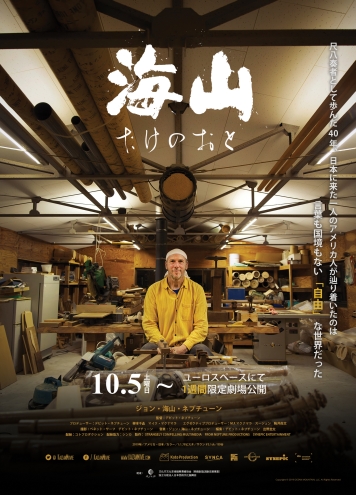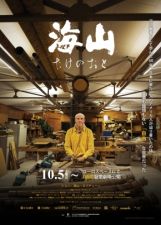A surfer dude discovers the shakuhachi and improvises to global acclaim
Sneak Preview Screening: WORDS CAN'T GO THERE (KAIZAN Take No Oto)
followed by a Q&A session with David Neptune and John Kaizan Neptune
and A very special musical performance by
John Kaizan Neptune, Hitoshi Hamada and Christopher Hardy
Thursday, September 26 at 6:30 pm*

*Please note early start time.
In English and Japanese with English and Japanese subtitles
Japan, 2019 89 minutes
Directed and edited by: David Neptune
Produced by: David Neptune, Chiaki Yanagimoto, Mike McNamara
Featuring: John Kaizan Neptune, Genzan Miyoshi, Kojiro Umezaki,
Diane Neptune, Kifu Mitsuhashi, Kaaraikkudi R. Mani,
Ghatam Giridar Udupa,Taizan Ohashi, Shinichiro Makihara, and more.
Music: John Kaizan Neptune
Film courtesy of Ocean Mountain, LLC
The story of a California surfer turned shakuhachi master: it sounds so cavalier, so attainable. And yet, as this penetrating, engagin documentary reveals, there's nothing casual about John Kaizan Neptune's mastery of the traditional Japanese flute, nor his ensuing fame.
John grew up in California and always drove himself hard, as family members make clear in interview footage. An early interest in the trumpet, inspired by his jazz trombonist father, gave way to an obsession with surfing, which led him to improve the surfboard by making his own, and finally, to enrolling college in Hawaii so he could catch the best waves. While there, he took an Introduction to World Music class on a whim, and discovered the shakuhachi. It was love at first note.
Arriving in Kyoto in 1973, John signed on with grandmaster Genzan Miyoshi and began a rigid apprenticeship. A fellow student recalls that John would record their teacher's playing on cassette, then "practice each phrase 500 times, 10 hours a day." He was promoted to master in record speed, took the shihan name "Kaizan" ("ocean mountain") and fled for the relatively free environs of Tokyo, where he could "do his own thing." That thing soon made him famous: John found his metier in the pioneering fusion of shakuhachi with jazz. Over the next decade, he appeared on innumerable TV shows, composed 80 pieces, released 10 albums ranging from jazz, classical and traditional Japanese to world fusion, and in 1980, became the first-ever non-Japanese to play a traditional instrument and win Best Record at the annual Record Taisho Awards.
John's improvisations had expanded the possibilities of the instrument, and even as Japanese traditionalists criticized the achievement, his impact became increasingly global. As he'd done with surfboards, he began innovating the shakuhachi to create sounds never heard before, resulting in what aficionados dubbed the "turbo shakuhachi" for its large bores, and earned a reputation as the best tuner in the world. His example and his enthusiasm were - and still are - inspiring musicians of every age in Japan and elsewhere.
But the journey to the top took its toll, and not just on Neptune. Directed by John's son David, "Words Can't Go There" touches on the sacrifices made by his wife and children while he was on the road half of every year, and on his own emotional distance. About the four- year process of filming, David says he set out to "document the human behind the artist - the heart of this father who wears the mask of a performer. Of course, he was most comfortable with the mask on. He lived that way. It became a test of endurance - which will fall first, his mask, or the camera on my shoulder?"
David's accomplishment is that "Words Can't Go There" immediately joins the ranks of that very small circle of films, made by the offspring of the famous, which truly illuminate what it means to be an artist, a parent and a legacy.
Please join us for this sneak preview, Q&A session and live musical performance prior to the film's opening on October 5th in Tokyo.
For more on the film: www.projectkaizan.com
Director/editor/producer DAVID NEPTUNE grew up in Chiba and attended Brooks Institute of Photography in California before starting a career directing new media and interpreting for renowned Japanese filmmakers like Hirokazu Kore-eda, Naomi Kawase and Takashi Shimizu. He found fame with comedy shorts on YouTube and Facebook, was the Tokyo unit line producer for the documentary "The People vs. George Lucas," and won awards for his horror short "Augustine." Most recently, David was a story producer for Boardwalk Pictures' Netflix series "Street Food" and Fox Sports series "Truth Be Told: Rick Ankiel."
Please make your reservations at the FCCJ Reception Desk (3211-3161) or register below. You may attend the Q&A session without attending the screening, but you will not have seating priority. All film screenings are private, noncommercial events primarily for FCCJ members and their guests.
- Karen Severns, Film Committee


